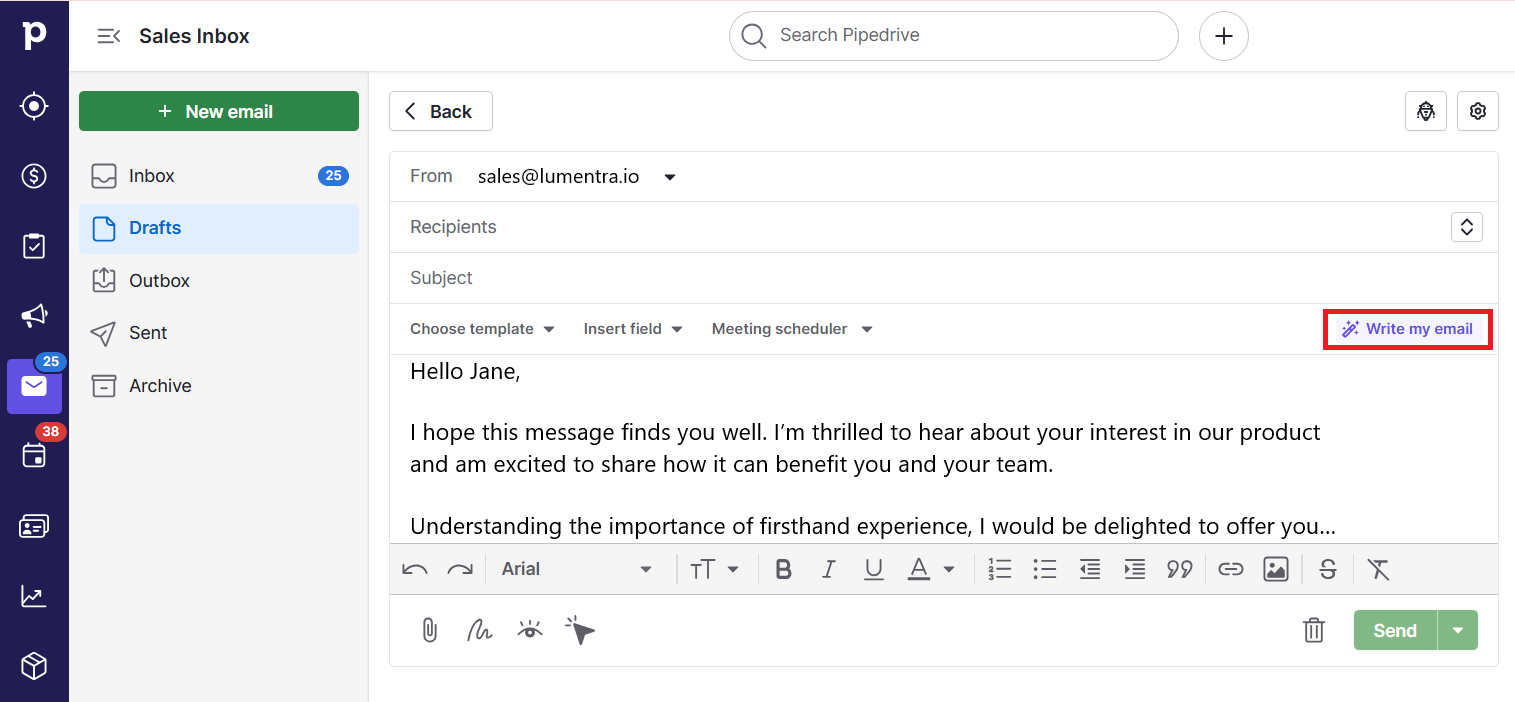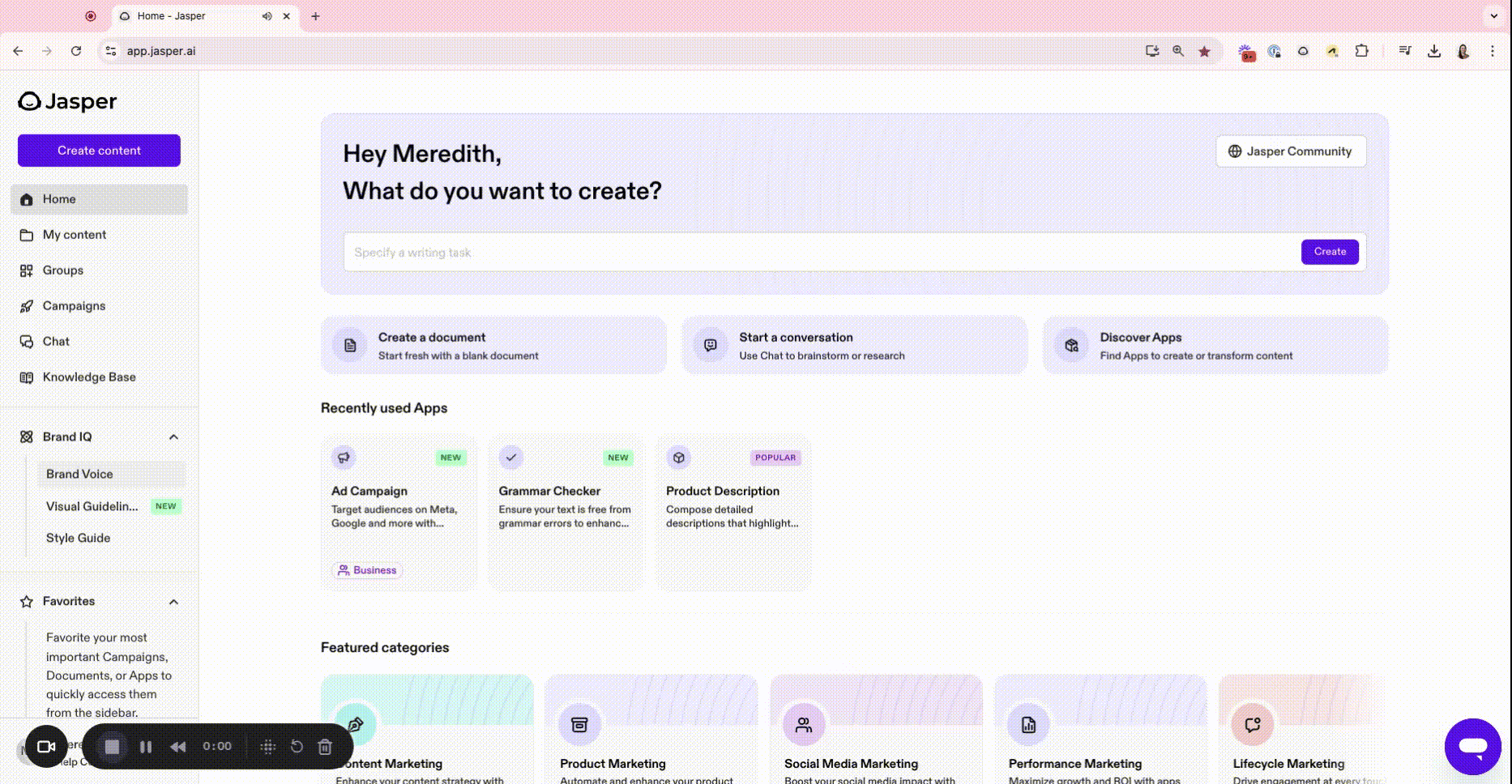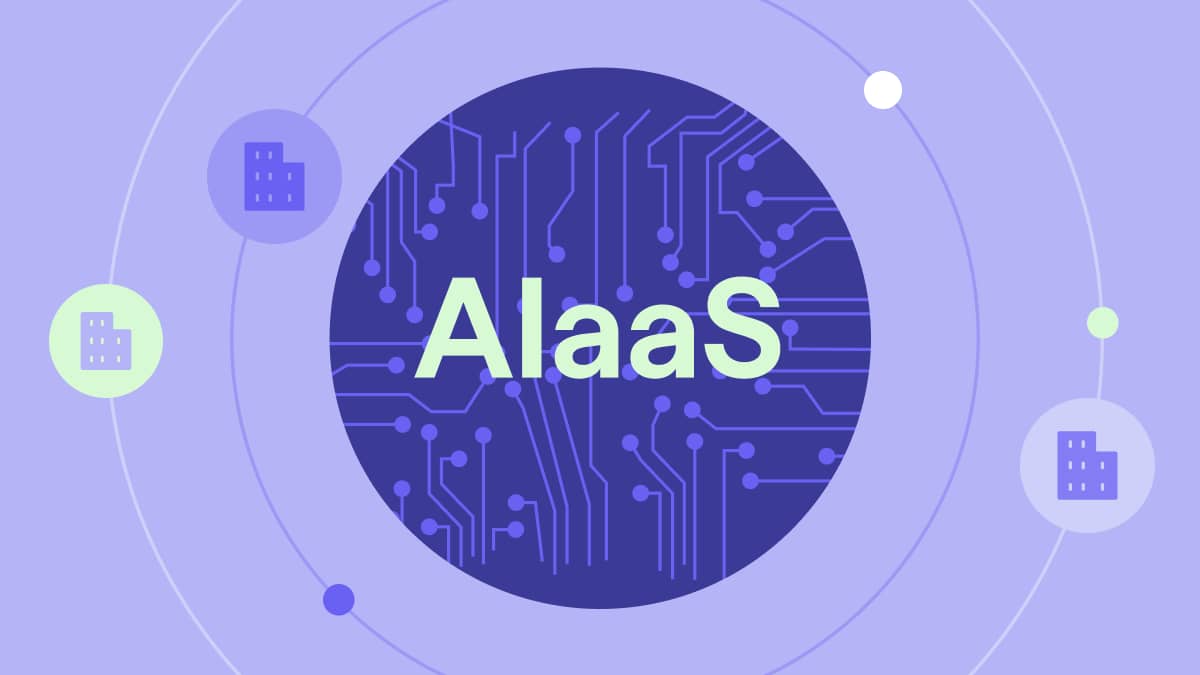Artificial intelligence can make small business digital marketing more efficient and effective, lightening team workloads and generating better results.
It’s also versatile. SMBs can use AI to enhance almost every part of the marketing process – from planning to execution and production to optimization.
In this guide, you’ll learn what AI digital marketing looks like in a small business, how to use it to drive more leads and the best AI marketing tools for SMBs.
What is AI digital marketing?
AI digital marketing uses artificial intelligence technology, like machine learning algorithms, natural language processing (NLP) and large language models (LLMs), to improve and automate tasks.
For example, AI digital marketing for law firms could involve brainstorming campaign research and strategy with ChatGPT. It may also include automating content creation using generative AI and analyzing success using sales forecasting.
Small business marketers can use several types of AI to perform tasks:
Tools analyze patterns in large datasets to create marketing copy, image and video marketing assets that mimic (but don’t copy) the training data. | |
Lead generation website chatbots use natural language processing to engage and nurture potential customers who land on your site. | |
Predictive AI | Machine learning models analyze sales and campaign data to identify key insights and forecast customer behavior. |
Pipedrive’s AI email writer is an example of generative AI (more on this later).
Sales and marketing professionals can use the tool to turn a simple prompt into a personalized marketing email in just a few clicks. It saves significant time, allowing small teams to reach hundreds of leads daily.

AI in digital marketing is widespread, with nine in ten marketing professionals using it in 35 countries. That doesn’t mean it replaces humans. Business owners and marketers still need to oversee AI tool outputs, flag errors, write prompts and build campaigns.
Download Your Sales and Marketing Strategy Guide
4 ways to use AI in digital marketing
AI has a wide range of digital marketing applications, making it challenging to know where to begin.
To help you get started, here are four practical tips to use AI effectively in your marketing strategy.
1. Creating content using generative AI
AI can create marketing content much faster than human writers and with fewer resources. While an email copywriter might take half a day to write an email campaign, a generative AI tool can create one in minutes.
In fact, McKinsey estimates generative AI could increase marketing productivity by 5% to 15% of total marketing spending.
Content creation is among the most popular small business AI marketing use cases. According to Pipedrive’s State of AI in Business 2024 report, 75% of companies use AI to generate content like blog posts, marketing emails and product descriptions.
Shopify has an AI content tool that acts as a business name generator and a lead generation magnet. It allows would-be entrepreneurs to find dozens of potential business names from a single prompt.

E-commerce marketers can also leverage tools like ChatGPT to write product descriptions and landing pages. SaaS marketers can apply generative AI to write blog posts and email campaigns.
For example, marketers can first instruct ChatGPT on product features and target audiences. Then, they’d ask it to generate a series of blog posts explaining how each product feature addresses a specific use case.
Generative AI enables small marketing teams to create significantly more content without hiring a dedicated copywriter.
Note: Proofread all AI content before publishing. Checking AI-generated work will catch hallucinations – where AI tools make up facts and figures – and ensure the copy aligns with your brand story.
2. Forecasting customer churn with predictive data analytics
AI can predict the outcome of marketing events by analyzing sales data, customer behavior metrics and market trends. It’s how platforms like Amazon and Netflix suggest shows you like.
Marketers can use predictive analytics to improve customer retention.
For example, consumer healthcare company Hydrant analyzed customer needs using predictive analytics to identify customers most likely to churn.
AI data analysis grouped its customers into three groups:
Customers who are very likely to make repeat purchases
Customers likely to transition to a recurring revenue subscription
Previous customers who might purchase again
Hydrant then sent personalized email marketing campaigns to each customer segment, resulting in a 260% increase in conversion rate and 310% higher revenue per customer.
Note: Sales reps can use Pipedrive Pulse to predict customer engagement levels and prioritize deals accordingly. The tool helps employees focus their efforts where they’ll have the biggest impact, improving win rates and building stronger relationships.
3. Engaging customers with conversational bots
Conversational AI tools help marketers provide around-the-clock customer service, which nurtures trust and loyalty.
AI tools are typically website chatbots that appear when customers land on a page. They can:
Answer frequently asked questions
Recommend products to buyers
Process orders or schedule sales demos
Collect customer information
For example, Intecom’s Fin delivers human-quality customer support at scale by training on company data to speak in your brand voice and follow internal processes.
Australian crypto exchange Swyftx uses Fin to handle almost half of all customer support requests without involving a human agent. It saves the team over 40 hours weekly and frees up agents to solve more complex queries.

Integrating AI chatbots with your CRM can further improve customer satisfaction. This allows chatbots to personalize their responses – delighting customers, enhancing their experience and reducing churn.
Note: Use the Chatbot feature in Pipedrive’s LeadBooster add-on to capture information from website visitors. While not AI-powered, the rule-based tool lets you customize the bot’s questions based on your sales goals, helping you qualify leads and add data directly to your customer relationship management (CRM) system. Pipedrive’s own sales team used the Chatbot to collect contact details from over 1,000 new leads.
4. Optimizing campaigns with AI analysis
AI tools help small business marketers optimize campaigns and generate results more quickly by analyzing real-time data. Machine learning models excel at finding hidden trends in vast amounts of data – the kind of insights that humans struggle to spot.
For example, Google uses AI to rapidly improve the results of Performance Max pay-per-click (PPC) campaigns.
Google’s AI optimizes ad bidding, targeting, creative selection and placement in real time. The technology constantly tests combinations to find the best mix to meet advertisers’ goals.
Seeing positive ROI from paid media campaigns can take weeks or months. With AI, marketers can start generating positive returns within days.
Why SMBs should use AI for digital marketing
AI tools are a blessing to marketers. Pipedrive’s State of Sales and Marketing 2024 report finds that 76% of sales and marketing professionals believe AI will support them. Only 8% think it will have a negative impact.
How do you think AI will impact your team in the future?
Here are the benefits of using AI for SMB digital marketing:
Boost productivity. Generative AI and automated workflows reduce human workloads, minimize errors and free up your staff’s time to focus on high-value tasks like campaign strategy. In the State of Sales and Marketing 2024 report, Pipedrive found that increased productivity is the biggest driver of AI adoption.
Increase ROI. AI helps marketers work more effectively and efficiently. Small businesses don’t need to hire expensive third-party agencies when they can generate great results with fewer resources. Using AI to create content and optimize marketing campaigns means lower costs and more revenue.
Personalize at scale. 53% of commercial leaders think AI will have a significant or very significant impact on personalized outreach. AI algorithms can analyze customer data to identify individual preferences and predict behavior. Marketers can use AI tools to tailor content and product recommendations to individual customers, increasing sales opportunities.
Improve decision-making. AI systems uncover insights human marketers may miss and ensure that every decision is profitable. AI eliminates guesswork and uses data to optimize future campaigns quickly and effectively, so SMBs don’t waste their budget. Pipedrive’s State of AI in Business report also found that 42% of AI adopters use the technology to gain insights that support more informed decisions.
Whether you leverage AI for a single use case or to create fully automated digital marketing campaigns, it will save you time, streamline your operations and boost your sales.
7 of the best AI and automation tools for digital marketing
Choosing the right tool can significantly impact your business’s success. Here are seven of the best AI tools for SMB digital marketing:
1. Pipedrive: best for integrated sales and marketing
Pipedrive is an AI-powered CRM that helps marketers and sales reps generate more leads and close more deals.
Marketers can use several of the tool’s AI features at different stages of their digital marketing campaigns.
AI Sales Assistant
Pipedrive’s AI Sales Assistant helps you make the most of the prospects in your pipeline by offering tips on customer engagement and task prioritization.
For example, it can recommend prioritizing one deal over another by forecasting the chance of winning.

It also sends follow-up reminders and notifications if you don’t have activities scheduled with high-potential prospects.
AI email writer
Pipedrive’s AI email writer helps you craft personalized emails for prospects. It automatically analyzes past communication patterns and customer profiles to create professional messages that boost engagement metrics.

The email tool enables busy marketers to send numerous, highly personalized messages in less time. It boosts the capacity of small business marketing teams without hiring additional staff.
Enter a simple prompt, edit the generated content to fit your needs and hit send.
AI Marketplace
Pipedrive’s AI-powered Marketplace search engine and SmartApps recommendations feature help you find the best marketing tools for your SMB.

Pipedrive analyzes your CRM usage to recommend additional software that complements your business practices. It can help you find the right AI integrations and marketing tools from over 500 apps without manual research.
Examples include Quil's AI Note-taker, ControlHippo’s AI Chat Agents and MeetRecord AI’s sales meeting analysis tool.
Price: Pipedrive’s AI tools are available on our pricing plans that start from $49 per user per month when billed annually. A 14-day trial allows you to experience the software for free.
2. ChatGPT: best all-around marketing assistant
ChatGPT, the popular chatbot developed by OpenAI, is used by 86% of businesses that have adopted AI.
ChatGPT’s versatility makes it a good all-around marketing assistant for small businesses that only want to use one or two tools.
For example, a B2B SaaS brand could use ChatGPT to:
Create a digital marketing strategy for a new product launch
Explore your target audience
Write website copy plus technical content for the resource center
Optimize search engine metadata
Design a marketing calendar for outreach
Suggest publications and social media accounts to promote the product
Here’s what ChatGPT’s output looks like:

The more information you provide ChatGPT, the more specific and comprehensive your results will be. Make sure to check results for accuracy, as the tool has a history of hallucinating.
Price: Limited free usage, with monthly premium plans starting from $20.
3. Jasper: best for copywriting
Jasper is an AI marketing platform that helps marketers quickly create high-quality, on-brand copy for content marketing campaigns.

It has one of the biggest selections of AI marketing apps, which can help you produce:
Blog posts
Product descriptions
Instagram captions
Landing pages
LinkedIn posts
Unlike ChatGPT, which requires you to edit content yourself, Jasper also offers a range of tools to improve and optimize marketing content.
For example, its Brand Voice lets you describe your company’s tone of voice, provide examples and include visual guidelines. The platform will create content in line with your marketing team’s goals.
Price: Three premium tiers start from $39 per user per month. Jasper also offers a seven-day free trial.
4. Canva: best for quick and easy design
Canva’s AI tool, Magic Studio, lets you craft on-brand images, videos, graphics and other design assets from a single prompt.

An AI digital marketing agency can use Canva to quickly mock up designs or create images for digital advertising campaigns.
Tell Canva what you want to create using a one- or two-sentence prompt, and it quickly generates a custom visual. A conversational chatbot helps you refine your design until it meets your needs.
Canva also provides several additional tools that automate design tasks. These include:
Magic Resize™ – transforms documents from decks into different kinds of documents, like case studies and reports
Highlights – generates short clips from long-form video and podcasts
Magic Expand – extends images in any direction
Price: Canva Magic Studio is available for free; usage limits apply. Canva offers three premium plans starting at $15 per user per month.
5. Sprout Social: best for social media
Sprout Social helps marketers build an AI-powered social media strategy that significantly reduces the amount of manual work for social media marketers.

The platform has dedicated tools for each part of a social media campaign:
Engagement – AI-powered summaries and replies make it faster and easier for marketers to create and respond to social media posts
Publishing – machine learning models suggest the best time to post content and help you generate captions
Listening – AI sentiment analysis helps marketers quickly understand customer emotions about topics
Analytics – AI analysts highlight the most insightful takeaways from your social media analytics to improve campaigns faster
Price: AI tools are available on Professional, Advanced and Enterprise plans, which start from $399 per seat per month.
6. Asana: best for marketing project management
Asana AI is the well-known project management tool’s AI agent that helps you automatically set up projects, run reports and identify risks.

Marketers can use a range of Asana AI features to automate workflows and complete simple tasks when managing marketing projects. These include:
Smart status – automatically draft status updates to find the roadblocks and blind spots that stop your campaigns from progressing
Smart chat – get a detailed rundown on marketing projects by asking questions to Asana’s AI chatbot
Smart summaries – understand what your team is up to with AI-generated task summaries that detail the key points of a project or task
Asana also has a generative AI tool that creates blog posts and social media copy alongside an AI smart editor. Marketers can use the editor to refine marketing copy by improving grammar, spelling and tone. It also ensures clarity and consistency across all communications.
Price: Asana AI is available on the Starter Plan (as well as the Advanced tier), which costs $13.49 per user per month.
7. Wisepops: best for on-site marketing
Wisepops is an on-site engagement platform that turns browsers into buyers using pop-ups, push notifications and AI-powered product recommendations.

Wisepop uses customer behavior data and web analytics to personalize buyer experiences and product recommendations by:
Suggesting best-selling items
Showing recently viewed products
Offering upsells when customers add items to their shopping carts
Delivering AI suggestions based on user behavior
An analytics dashboard gives marketers real-time views of which products customers see, click and purchase. It helps them identify top performers and use the insights to inform future marketing campaigns.
Price: AI features are only available on Wisepops’ Intelligence plan, where pricing is available upon request.
Note: Wisepops integrates with Pipedrive so you can send lead generation data directly to your CRM. This means marketers spend less time on manual data entry and more time nurturing leads.
How to choose AI digital marketing tools
The best AI digital marketing tool will depend on your needs and goals. For example, if you don’t have an in-house copywriter, you’ll want a tool with content generation capabilities.
With that said, every AI tool should have these core features and functionalities:
Feature | What to look for |
Usability | Choose tools with user-friendly design and clean interfaces. Employees will adopt easy-to-use tools faster, which will increase time to value. |
Integrations | Prioritize tools that connect to your CRM software and other business apps to centralize data. Native integrations ensure data flows seamlessly between apps. |
Scalability | Look for tools with additional subscription plans or add-on features to support your future business needs. |
Security | Pick tools with a wide range of security features, such as multifactor authentication and user access control. Check that tools comply with data protection rules. |
Support | Opt for tools with a high level of ongoing support. Knowledge bases, tutorials and forums will answer common questions and issues. |
Pricing | Select tools within your budget. To reduce your spending, consider software that serves multiple purposes, such as Pipedrive. |
Free trials and demos are good ways to assess tools in your shortlist. Checking for the above features and functionalities will ensure AI tools help your team meet current and future goals.
How to make the most of AI digital marketing tools
Choosing the right AI tool is just the start. By following these best practices, you’ll get the most out of your platform and accelerate time to value.
Train and support employees
While limited AI skills and expertise are the top barrier to adopting the technology (33%), ongoing training and support can help you overcome this challenge.
The more training you offer staff, the more confident they’ll become and the quicker they’ll adopt the tools.
As well-trained employees pick up new tools, small businesses often see the benefits of AI – higher productivity, reduced resource requirements and increased revenue – sooner while recouping their investment.
Use the following strategies to increase tool familiarity:
Involve key personnel in software demos. Invite relevant people from your marketing department to join you during product demos. It will familiarize them with the tool and allow them to ask the sales staff questions.
Organize training sessions. Host workshops that explore your tool’s features in depth. Show employees how to use the AI to achieve marketing tasks like writing a landing page or building a report. Include a Q&A session at the end to answer questions and concerns.
Provide access to knowledge hubs and other resources. Make sure your employees have access to your software’s educational resources. If your tool has customer support, give your team the contact details.
Ongoing support will help marketers continue to use AI tools effectively and overcome issues. Schedule regular check-ins with your team to assess their progress and troubleshoot problems.
Integrate your tool with the rest of your tech stack
If you use AI chatbots to interact with customers, connecting them to your CRM, customer data platform (CDP) and the rest of your technology stack will deliver more personalized customer experiences. Customized interactions build trust and can increase your conversion rates.
For example, integrating a chatbot with your CRM lets it analyze previous interactions and customer behavior to make personalized product recommendations.
You’ll usually find step-by-step integration instructions in your tool’s support center. Here’s what the process looks like if you want to connect Wisepops to Pipedrive:

Test your integrations with demo data before using them in a live campaign. It will ensure data moves accurately between the two platforms and avoid embarrassing marketing faux pas, like addressing prospects by the wrong name.
Overcome key AI challenges
While AI technology platforms are powerful, they’re not perfect. There are challenges and pitfalls you’ll need to avoid, including the following:
Challenge | Solution |
Adoption resistance. Employees may be reluctant to use AI tools, fearing these will replace them. | Clearly communicate the purpose of AI to alleviate staff concerns and encourage them to use the tools. Emphasize how tools help marketers automate repetitive and time-consuming tasks so they can focus on strategic initiatives. |
Data privacy concerns. AI tools need access to sensitive data to generate insights and recommendations. | Choose tools with strong security standards and regular software updates to prevent data breaches. Encrypt any data you send so that even if someone intercepts it, they won’t be able to read it. |
Data quality. Poor or inaccurate data can lead to low-quality results. | Ensure your data is clean, organized and up to date before using an AI tool. Regularly audit your data and AI outputs for inaccuracies that can negatively affect the customer experience. |
Hallucinations. Generative AI tools sometimes produce results that look okay on the surface but are factually inaccurate or off-topic. | Have your team review AI outputs to prevent errors and mistakes that could damage your brand’s reputation. Proofread and edit all AI-generated content before publishing to ensure relevance and reliability. |
Staying on top of these challenges requires continual effort. Meet with your marketing team monthly to discuss issues and brainstorm ways to overcome any new AI-related problems.
Final thoughts
The power of AI makes your marketing department faster, more productive and more effective. It also improves the customer experience through personalization, ultimately increasing the likelihood of conversion.
If you’re integrating AI into your digital marketing efforts, you’ll also want to use an AI-driven CRM. You can customize your digital marketing efforts and capture more marketing-qualified leads through native AI capabilities and third-party apps.
Sign up for Pipedrive’s 14-day free trial today to see how its AI features and integrations help you convert more prospects.







